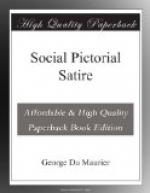His lines are as few as can be—he is most economical in this respect and loves to leave as much white paper as he can; but one feels in his best work that one line more or one line less would impair the perfection of the whole—that of all the many directions, curves, and thicknesses they might have taken he has inevitably hit upon just the right one. He has beaten all previous records in this respect—in this country, at least. I heard a celebrated French painter say: “He is a great man, your Charles Keene; he take a pen and ink and a bit of paper, and wiz a half-dozen strokes he know ’ow to frame a gust of wind!” I think myself that Leech could frame a gust of wind as effectually as Keene, by the sheer force of his untaught natural instinct—of his genius; but not with the deftness—this economy of material—this certainty of execution—this consummate knowledge of effect.
To borrow a simile from music, there are certain tunes so fresh and sweet and pretty that they please at once and for ever, like “Home, Sweet Home,” or “The Last Rose of Summer”; they go straight to the heart of the multitude, however slight the accompaniment—a few simple chords—they hardly want an accompaniment at all.
Leech’s art seems to me of just such a happy kind; he draws—I mean he scores like an amateur who has not made a very profound study of harmony, and sings his pretty song to his simple accompaniment with so sweet and true a natural voice that we are charmed. It is the magic of nature, whereas Keene is a very Sebastian Bach in his counterpoint. There is nothing of the amateur about him; his knowledge of harmony in black and white is complete and thorough; mere consummate scoring has become to him a second nature; each separate note of his voice reveals the long training of the professional singer; and if his tunes are less obviously sweet and his voice less naturally winning and sympathetic than Leech’s, his aesthetic achievement is all the greater. It is to his brother-artists rather than to the public at large that his most successful appeal is made—but with an intensity that can only be gained by those who have tried in vain to do what he has done, and who thereby know how difficult it is. His real magic is that of art.
This perhaps accounts for the unmistakable fact that Leech’s popularity has been so much greater than Keene’s, and I believe is still. Leech’s little melodies of the pencil (to continue the parallel with the sister art) are like Volkslieder—national airs—and more directly reach the national heart. Transplant them to other lands that have pencil Volkslieder of their own (though none, I think, comparable to his for fun and sweetness and simplicity) and they fail to please as much, while their mere artistic qualities are not such as to find favour among foreign experts, whereas Keene actually gains by such a process. He is as much admired by the artists of France and Germany as by our own—if not more. For some of his shortcomings—such as his lack of feeling for English female beauty, his want of perception, perhaps his disdain, of certain little eternal traits and conventions and differences that stamp the various grades of our social hierarchy—do not strike them, and nothing interferes with their complete appreciation of his craftsmanship.




